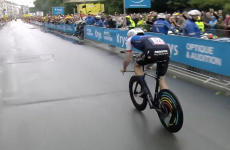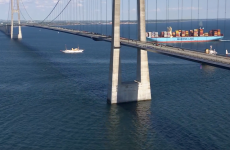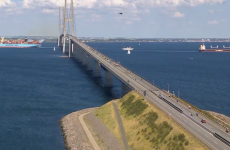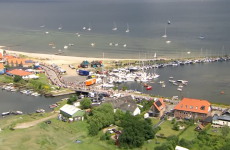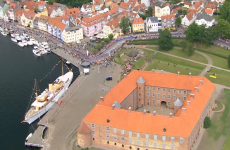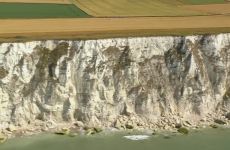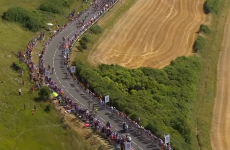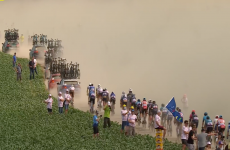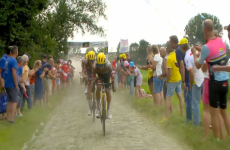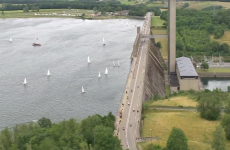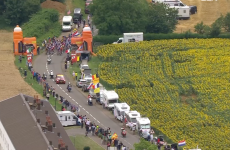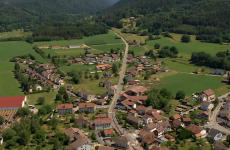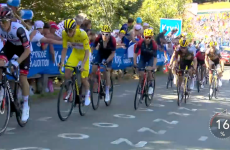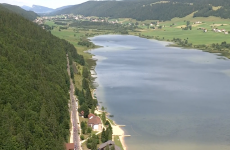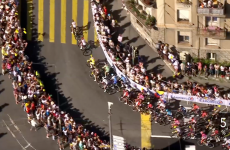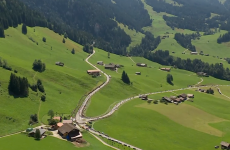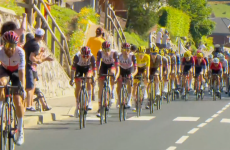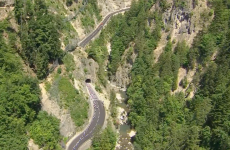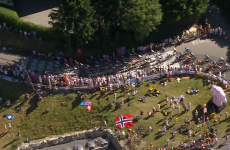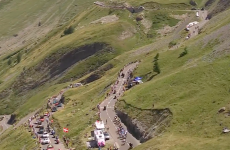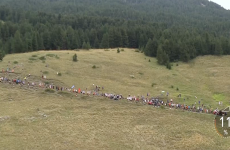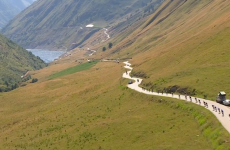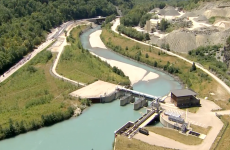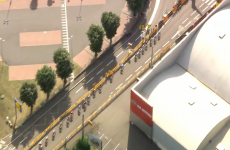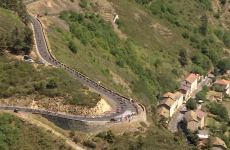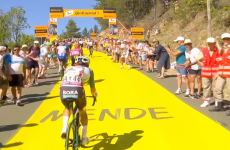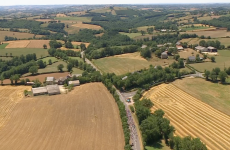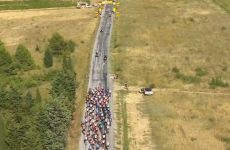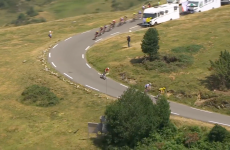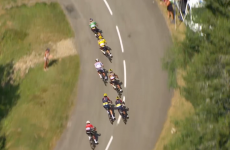Description
July 14, 2022
Tour de France 2022 – Stage 12 – Briançon – L’Alpe d’Huez : 165,1 km
For three weeks of the year cycling fans put their bikes away and root themselves to their sofas,
Show more...
July 14, 2022
Tour de France 2022 – Stage 12 – Briançon – L’Alpe d’Huez : 165,1 km
For three weeks of the year cycling fans put their bikes away and root themselves to their sofas, eyes fixed on their television screens as they watch one of the greatest races of the season play out in front of them. We are, of course, talking about the Tour de France – the one bicycle race that nearly everyone on planet Earth has heard of. This three-week race is regarded by many as one of the toughest sporting events in the world. With 21 gruelling stages to complete over a 23-day period, adding up to around 3,500km in total, the Tour de France is a race of pure endurance. The winner isn’t necessarily the strongest rider, but rather the one who can survive the most suffering, day after day. Five-time winner of the Tour, Bernard Hinault, summed up just what it takes to win this great race: “You can’t win without suffering. Whether it’s in the mountains or in a time-trial, you have to spare no effort. You may feel drained at the finish, but the joy of winning helps you forget everything.” The 2022 route, which is due to start in Copenhagen, Denmark, and finish in Paris, France, is headlined by six summit finishes, two individual time trials and a high-mountain stage that will see the riders grovel their way to the the 2,413m-high summit of the Col du Granon. The rest of the route features hilly stages aplenty, but only a couple of flat stages for the fastmen. In place of sprinting opportunities this year, the organisers have opted for dynamic stages that will suit a wide array of riders and promote aggressive and entertaining racing.
Tom Pidcock (Ineos Grenadiers) marked his debut Tour de France with a flourish on stage 12, taking a sensational victory atop the legendary climb to L’Alpe d’Huez.
The 22-year-old Briton was a latecomer to the day’s breakaway but flew down the Col du Galibier to join the fray on the Col de la Croix de Fer, before riding away alone 10km from from the summit of the famous final climb.
Roared on by the raucous Bastille Day crowds, Pidcock held off Louis Meintjes (Intermarché-Wanty-Gobert Matériaux), while his compatriot Chris Froome (Israel-Premier Tech), 15 years his senior, came back to life after three years in the post-injury wilderness to take third place on the stage.
Further down the 21 hairpin bends, Tadej Pogačar (UAE Team Emirates) came out swinging after his crushing defeat the previous afternoon, but was unable to shake the rider who’d taken his yellow jersey, Jonas Vingegaard (Jumbo-Visma).
Pogačar launched three accelerations on the final climb of a second successive high-Alpine stage, but Vingegaard responded instantly to them all, the last one being the final surge for the finish line. Geraint Thomas (Ineos Grenadiers) yo-yo’d off the back of the duelling duo but was the only rider to finish alongside them, taking him back onto the overall podium at the expense of Romain Bardet (DSM).
The stage didn’t see Pogačar turn the tables but he did deliver a statement of defiance, a message that Wednesday was a blip and there’s plenty of life left in the Tour.
The appetite is whet for the Pyrenees in the final week, but the final day in the Alps belonged to Pidcock, who used every tool in his locker to claim the biggest result of his road racing career. The Olympic mountain bike champion and world cyclo-cross champion rode away from a classy breakaway to solo 10km up the hors catégorie climb to l’Alpe d’Huez, but it was the way he got into that break that was perhaps the most spectacular thing.
He was in the peloton at the top of the Galibier after 30km, but put on a descending masterclass to fly across what was almost a two-minute gap to the front of the race. Froome, was looking to do the same after attacking on the Galibier itself, could only watch as Pidcock cut ahead of him and then spat him out, but the youngster mercifully waited up so they could eventually work their way over to the break.
Such was Pidcock’s enthusiasm, as soon as they’d made contact with the head of the race, he cut some even more daring lines down the final part of the long descent and went solo into the valley. He promptly waited for the group to reform for the Croix de Fer – nearly 30km long – but it he again who forced the issue on the steeper slopes of the final 5km, with just Meintjes, Froome, Neilson Powless (EF Education-EasyPost), and Giulio Ciccone (Trek-Segafredo) able to follow.
The quintet established a stage-winning margin of a Jumbo-Visma led peloton but collaboration soon broke down on the 13.8km final climb to l’Alpe d’Huez, and it was Pidcock who took charge once more, first stopping pedalling to encourage others to share the work, before almost instantly hitting them with an attack. He was clear at the first time of asking and, despite brave resistance from Meintjes and Froome, rode alone for almost 10km through the sea of fans and the wall of noise.
“It is certainly one of my best experiences in cycling, it was unreal. When you are literally slaloming through people’s flags, fists and god knows what else, you can’t experience that anywhere else, in anything, other than on l’Alpe d’Huez at the Tour de France,” Pidcock said.
“It’s made my Tour de France so far. Even if something happens and I get dropped every day, I don’t care. A stage win at my first Tour, it’s not bad.”
The GC battle
With the yellow jersey having passed to Vingegaard after Wednesday’s thriller, Jumbo-Visma took charge and made a more controlled affair of the second day in the Alps. They marshalled things on the early climb up the Galibier, then started to the bunch on the Croix de Fer, before setting up a mountain train on l’Alpe d’Huez.
Sepp Kuss was the last man, and the damage was such that only four riders remained with him 5km from the top: Vingegaard, Pogačar, Thomas, and Enric Mas (Movistar). Pogačar didn’t wait for Kuss to finish his turn, springing into attack with just over 4km to go. Vingegaard was straight on it and the pair flew away from the rest, although the subsequent lull allowed Thomas, Kuss and Mas to rejoin.
Pogačar wound up an even bigger acceleration 2.5km from the top, but the outcome was exactly the same. Kuss returned to calmly pilot them into the final 150 metres, whereupon Pogačar launched his third and final sprint, but Vingegaard remained glued to the wheel.
Thomas anticipated and tracked the pair on that occasion to finish on the same time, with Mas fading by three seconds but recovering after his disastrous day on stage 12. Bardet, dropped by Kuss’ first turn, limited the damage to 19 seconds, riding past Adam Yates in the process, the Ineos co-leader losing a more damaging 38 seconds. Nairo Quintana (Arkéa-Samsic) and David Gaudu (Groupama-FDJ), meanwhile, were dropped during a particularly short and sharp turn from Roglič further down the mountain.
Pogačar therefore moves to second overall, still 2:22 behind Vingegaard, with Thomas third at 2:26. Bardet falls two places to fourth at 2:35, while Yates rounds out the top five at 3:44.
“After yesterday, I didn’t have the best legs today,” said Vingegaard. “Tadej attacked me a few times at the end and I would also expected him to, luckily I was able to follow him every time and I’m happy with that.”
How it unfolded
After Wednesday’s breathlessness, the stage started out in calmer fashion, with Powless the biggest name in an initial six-man breakaway that also contained Nelson Oliveira (Movistar), Anthony Perez (Cofidis), Kobe Goossens (Intermarché-Wanty-Gobert), Gerhard Schönberger (B&B Hotels-KTM) and Matîs Louvel (Arkéa-Samsic).
After an early intermediate sprint, where Van Aert added to his green jersey points haul from the bunch, the climb up to the Galibier began, starting out in gentle fashion with the 12km haul up the Col du Lautaret. The bunch threatened to explode when a string of counter-attacks saw the likes of Roglič, Steven Kruijswijk (Jumbo-Visma), Aleksandr Vlasov (Bora-Hansgrohe), and Pidcock slip away, but it was Van Aert who dragged it back and set a brisk tempo.
Ciccone did manage to get away, though, and he was soon joined by Meintjes, who’d been propelled by his teammate Georg Zimmerman. They reached the break just past the Lautaret, where Perez attacked and Louvel dropped. The top section of that side of the Galibier saw the gradients ramp up, and Froome took the chance to attack from the peloton.
At the summit, at 2642 metres, Perez led alone, followed by Ciccone, Meintjes, and Powless, and then the rest of the breakaway stragglers. Froome crested at 1:40, 15 seconds clear of the peloton.
The descent played host to a stunning exhibition of descending from Pidcock, who threw himself into every corner and flew away from the peloton. He passed Louvel on a cliff edge in hair-raising fashion, and then cut in front of Froome on a hairpin. He chose to wait for Froome on a flatter section and they used the short mid-descent climb to the Télégraphe to work their way up to the reformed breakaway ahead.
From the Télégraphe, the road dipped down for another 10km and Pidcock went even faster. As he and Froome latched on, he went straight past the group and out the front, joining Powless, who’d attacked himself, and then even leaving Powless behind. Pidcock was spat out onto the flat, waited for Powless, and then, with a stint in the valley to follow, sat up for a nature break and waited for the group to reform. At that point, they had five minutes on the peloton, and had taken that out towards the seven-minute mark by the start of the Col de la Croix de Fer – 29km at 5.2% but with two short descents and several steep sections.
The situation remained stable in both break and bunch until the exact same spot just over 5km from the top, where there were sustained gradients of over 7%. At that point, Pidcock decided to lift the pace, with only Ciccone, Meintjes, Froome, and Powless able to follow. Behind, Jumbo-Visma did the same. Christophe Laporte had led all the way up but it was over to Nathan van Hooydonck and then Van Aert. The bunch had been thinned by the former but it was the latter who did the real damage, reducing the group to 40 riders and dropping a key teammate for Pogačar in Brandon McNulty.
At the top of the Croix de Fer, Ciccone led the breakaway to claim maximum mountains points but their lead had been cut to 4:20. On the descent, Pidcock played a leading role once again, although he didn’t ride away from his companions this time, and they made back up for their lost time. They worked well together on the 15km stretch down the valley and took a lead of six minutes onto the Alpe.
Alpe d’Huez
As the breakaway took on the lower slopes and early hairpins, Tiesj Benoot led the peloton through the valley and handed over to Jumbo-Visma teammate Van Aert for the start of the Alpe.
After two kilometres of climbing, the breakaway battle lit up. Powless was the first to find himself in trouble under a Meintjes turn, but then worked his way back during a lull. There was such a lull, in fact, that Pidcock stopped pedalling in order to encourage others to help share the pace-making. With no response, the young Brit attacked, and eased clear immediately, splitting the group to pieces. Meintjes led the chase, then Froome, as Ciccone and Powless fell away. The gaps between the remaining trio remained static as they all rode at the same tempo for nearly 3km.
Behind, Van Aert led the peloton until 10km from the summit, almost coming to a halt as he ended his turn with the gap only slightly down to 5:10. From there it was over to Kruijswijk but, with Pidcock still 5 minutes ahead, it looked like a controlling job as much as anything.
Pidcock found a new acceleration as the crowds thickened 7.5km from the summit and pushed both Meintjes and Froome further back. The road narrowed to a mere corridor at times and he fed off the fans, moving to 28 seconds clear of Meintjes with 5km to go as Froome slipped to almost a minute.
There was an acceleration down the mountain, too, as Kruijswijk pulled off and handed over to Roglič. In the blink of an eye, the group was down to just 10 riders, with Gaudu and Quintana among the big names to lose contact. Roglič’s turn was sharp but short and he soon handed over to Kuss. The US rider quickly landed a major victim in Bardet, second overall, who couldn’t hold the wheel. After another few hundred metres, Yates had to back off as well. At that point, 5km from the summit, the GC group was down to just five: Kuss, Vingegaard, Pogačar, Thomas, and Mas.
When Kuss started to ease, Pogačar made his riposte to Wednesday’s defeat. He didn’t even wait for Vingegaard but immediately hit out. The yellow jersey was alive to it and they went clear as a duo once again. When it was clear he wasn’t gapping his rival, Pogačar eased, Thomas rejoined, and Vingegaard took it up at a steady enough tempo to allow Kuss to come back to work.
Meanwhile Pidcock gradually turned the screw. Meintjes battled gamely but the Ineos rider hit the 2km-to-go banner with 35 seconds in hand. Froome, meanwhile, had slipped to 1:35. Provided he didn’t suddenly crack or get taken out by a drunken spectator, victory was his, and he raised his arms to the sky as he celebrated victory at one of cycling’s most sacred sites.
Down the mountain, Pogačar lit things up again but with the same outcome. Kuss quietly came back and led to the final 150 metres, where Pogačar gave it one last roll of the dice. He couldn’t shake Vingegaard by a single metre, but he had at least stopped the rot.
Results :










